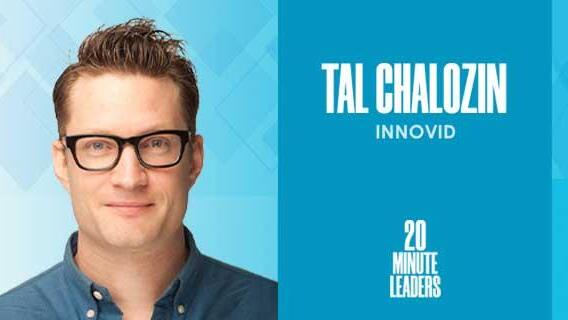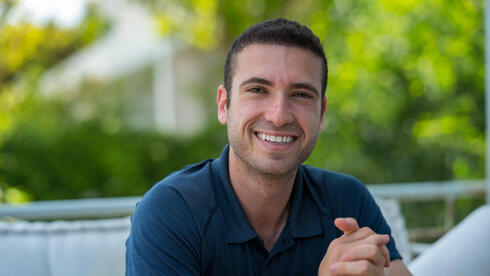
20-Minute Leaders
“I am interested in the place where art meets technology.”
As online videos began to flourish, Innovid CTO and co-founder Tal Chalozin was fascinated by how easily he could make things happen with the internet.
As online videos began to flourish, Tal Chalozin was fascinated by how easily he could make things happen with the internet. With no electronics training, he shares that he could order parts online, then watch YouTube to learn how to build robots. This creativity and curiosity guided him through his time working on software in the Air Force and to co-founding GarageGeeks and Innovid, where he is currently CTO. Chalozin says GarageGeeks and Innovid are similar in that they combine art and technology. Innovid started in 2007 with a vision that television would move to the internet and become more interactive and personalized, he shares. Being passionate about creativity and what’s coming next help fuel Innovid’s continual innovation, allowing it to stay ahead of larger competitors, Chalozin explains. When new customers come on board, they say Innovid’s focus on innovation was very attractive.
Click Here For More 20MinuteLeaders
Who are you, Tal? Take me back to your Israeli Air Force days.
Together with Zvika Netter and Zack Zigdon, we started Innovid about 15 years ago with the vision that television is going to move to the internet. Television will be more of a two-way communication. And, because it runs on an internet platform, you can do so many more things, like personalize the message so that everyone sees the ad that is relevant for them. Then marketers don't need to bombard the market with advertising because each of them can work so much harder. That's a general premise.
But you wanted to start at the Air Force. I was in the Mamram program after graduating high school, and then I chose to join the Air Force. I was in the unit that makes most of the operational software for the Air Force. I was a developer, then a team leader. Then I was on the general architecture team across the Air Force building some of those systems. I ended up staying for about eight years, really enjoying that world. It's pretty fascinating that you as a kid, 19 years old, can deal with pretty cool software. You can lead a team and build something that is very impactful, very complicated, and very rigorous and in a very advanced system.
At the tail end of my service, I was doing a lot of work around video processing. Then I just became curious about the general idea that we can process video and insert elements into the video. That was the time when YouTube started emerging. It was clear that there's some form of a video creation revolution, and we wanted to be part of that.
You are also co-founding GarageGeeks. Tell me about that. I'm curious about the transition from developer team leader to an innovator.
It's more about curiosity than anything. So GarageGeeks is a place we started because we love playing Xbox and drinking beer, and we said, "There may be other people that have the same passion and they don't really have a place to go." It started with this idea of, let's all meet together, play video games and talk about electronics, robotics, and other things, literally for the sole sake of curiosity. The idea is that if you are curious about technology, you are curious about music or other elements for true curiosity and your passion to learn, maybe you can meet like-minded people and just geek on it. You can tie a lot of it to Innovid as well as the connection or the place where art meets technology. A lot of the things that we created were artistic in nature but heavily focused on technology.
What drove me to be excited about this was when I discovered that you can go on the internet, and I literally knew nothing about electronics, but I can order different electronic components over the internet and just watch YouTube videos and then build robots. I was mostly mesmerized about the ease that you can actually make things happen.
We are in 2006, back to Innovid a little bit: you are realizing that we are in the middle of the creator transformation. Do you realize that it's going to take on multiple revolutions?
We came from a truly naive approach that we never even tried to predict where the future will be. The one thing we knew is that we all lived in a world pre-iPhone and post-iPhone, pre-social network and post-social networking, and the same thing about the internet. We felt that those massive technological inventions just change the world so much that you cannot predict what the world would look like, but you do know that it will be very different. The consumption of media, everyone would still enjoy that, but everything around it will change massively.
We never thought to even imagine what the future would look like. We felt, "It's going to change massively. It's going to be over the internet. It's going to be software-powered. We want to insert ourselves in there. Let's just start a journey." We raised our A-round without really knowing what we were about to do. We started heavy on the creative side with "power to the producers," allowing YouTubers to create interactive videos and really cool music videos.
Back in 2008 or so, we did a partnership with a Canadian studio that produced live band shows and broadcast them all over the internet. We created things that you can insert logos in a really cool way on the stage itself by superimposing them. This is what we did at the beginning.
Then the internet, the online video, YouTube started to take off, so we realized that maybe we are onto something so we can build other things. Then Innovid as it is today was born with different software platforms for large marketers. If you are a very large brand, managing when you stream your ads on YouTube, Hulu, Disney, and many other places in a hundred countries, you need a centralized system that manages everything. This is what we do right now.
How do you, as a company, stay ahead of the game?
Innovid is 600 people right now. We made a big acquisition of about 150 people with a company called TVSquared earlier this year. How do we stay ahead? So we named the company Innovid, which stands for "innovation and video" for a reason. Google has a division called DoubleClick, and that's our main competitor. Almost all of our growth comes from customers that are moving from Google and shifting to Innovid.
There's this VC question for A-round entrepreneurs that asks, "What will stop Google getting a hundred of the best engineers in the room and rebuilding what you did?" Our answer is that we will always win on innovation. Because we are passionate about creativity and the changes in the industry, we put innovation as a core tenet of everything that we do. We always try to guess where the market is going. Back in 2014, we assumed that it would be streaming. We had a whiteboard session saying, "Maybe someday people will disconnect their cable and will stream television; let's start building that right now. We will put engineers on it." We had no clue when it will start making money.
How do you get people within your organization to be thinking in that same mindset and take risks?
I just want to put it in context that it's not that we constantly navigate the whole company to do things that we have no clue if they will mature. We took the company public at the end of last year, and we just reported in our last earning that General Motors, who's one of Google's largest customers, decided to move to Innovid. We ask a customer after every win, "What made you choose Innovid?" Everyone is saying it’s that relentless focus on innovation and the belief that we want to build a futureproof platform. This is what drove them to move to Innovid. We invest, in the grand scheme of things, a small percentage of our R&D and product resources in that, but we take it seriously.
How do we tell people to take those risks? We show that you do not need to chase the exact dollars, but derived dollars actually come along. General Motors chose Innovid. This is a many, many millions of dollars customer. They chose it because of their belief in innovation. Even if they don't really pay the dollars for that, they end up buying the standard product. But what drove them to Innovid is that innovation is something that they want to be associated with.
Michael Matias, Forbes 30 Under 30, is a Venture Fellow at Innovation Endeavors as well as investment Venture Partner at Secret Chord and J-Ventures. He studies Artificial Intelligence and Human-Computer Interaction at Stanford University, and was an engineer at Hippo Insurance. Matias previously served as an officer in the 8200 unit. 20MinuteLeaders is a tech entrepreneurship interview series featuring one-on-one interviews with fascinating founders, innovators and thought leaders sharing their journeys and experiences.
Contributing editors: Michael Matias, Megan Ryan

